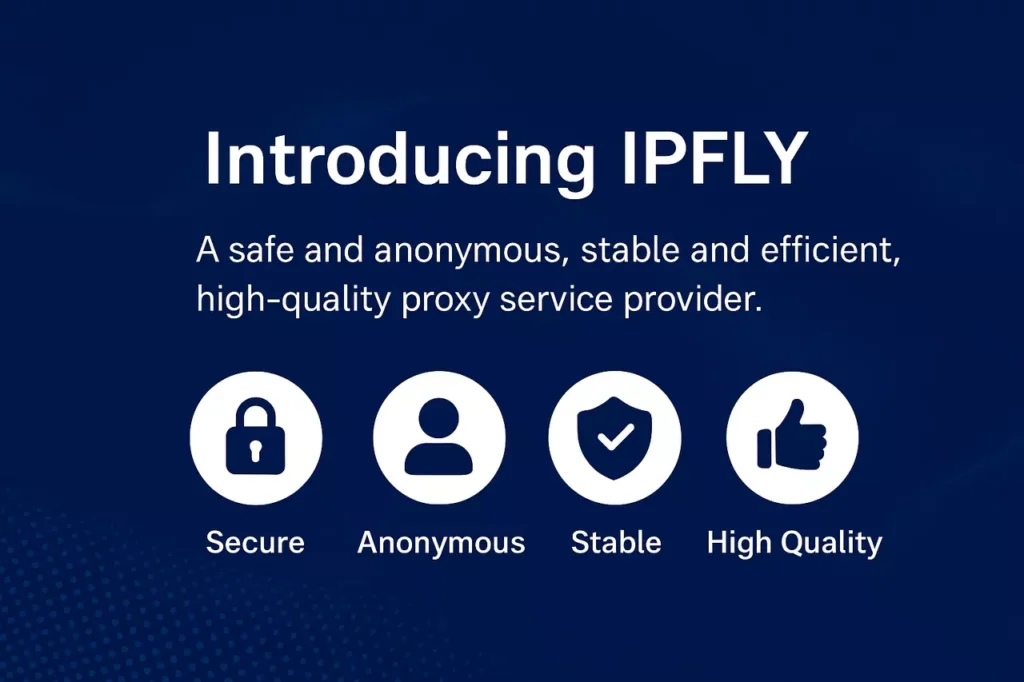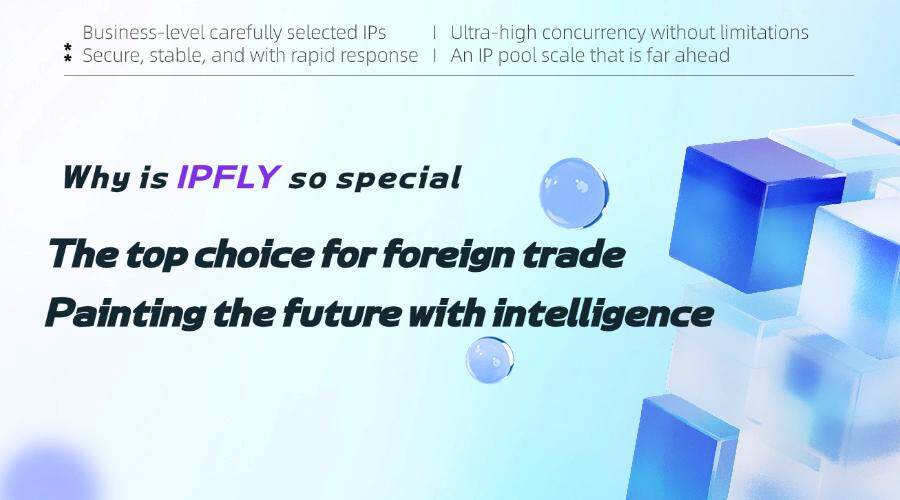In 2025, online platforms are more aggressive than ever at identifying and blocking traffic from anonymous proxies. If your business relies on proxies for ad verification, market research, SEO auditing, or managing multiple accounts, you’ve likely encountered the frustrating “anonymous proxy detected” message.
This issue doesn’t just block access — it can disrupt data collection, hinder campaign monitoring, and risk account bans. But with the right infrastructure and strategy, it’s avoidable.
In this guide, we’ll explain what triggers anonymous proxy detected errors, why platforms actively scan for them, and how premium proxy providers like IPFLY help businesses maintain secure, undetectable proxy access for their daily operations.

What Does “Anonymous Proxy Detected” Mean?
Most modern websites and online services have anti-abuse mechanisms that monitor visitor IP addresses. When these systems identify an IP address associated with a proxy server — especially one not tied to a residential ISP or with suspicious activity patterns — they flag it.
An anonymous proxy detected error means the website recognizes your traffic as coming through a proxy server and has either:
- Blocked the connection
- Presented a CAPTCHA challenge
- Restricted certain account functions
- Flagged your activity for review
Why Platforms Detect Anonymous Proxies
1️⃣ Preventing Fraud and Abuse
Many proxies, particularly datacenter proxies and free proxy services, are exploited by bot operators and bad actors for spamming, credential stuffing, ticket scalping, and DDoS attacks. To safeguard their platforms, websites proactively scan for proxy IP ranges.
2️⃣ Enforcing Geo-Restrictions
Video platforms, ticketing services, and e-commerce sites often limit content or pricing by region. Proxies can bypass these limitations, so platforms work to detect them and preserve licensing agreements or market segmentation.
3️⃣ Maintaining Ad Integrity
For advertisers, it’s crucial that ads are served to legitimate audiences. Ad fraud detection systems flag proxy traffic as suspicious to protect clients from invalid impressions or clicks.
Common Ways Proxies Get Detected
Understanding how websites detect proxies helps you choose better tools and strategies. Common detection methods include:
- IP Range Blacklists: Publicly known proxy IP lists that are auto-blocked
- ASN (Autonomous System Number) Filtering: Blocking IP ranges from hosting providers
- DNS Leak Tests: Identifying discrepancies in DNS resolution paths
- Browser Fingerprinting: Detecting mismatches between your browser and IP characteristics
- Traffic Pattern Analysis: Spotting unusually high request volumes or bot-like behavior
How IPFLY Helps Bypass ‘Anonymous Proxy Detected’ Errors

Unlike free or low-quality proxy services, IPFLY offers enterprise-grade proxy solutions purpose-built to avoid detection while maintaining ethical, compliant standards.
🌐 100% Authentic Residential Proxies
IPFLY routes your traffic through real, clean IP addresses from residential ISPs in over 190 countries. These IPs blend naturally with genuine user traffic, making them far less likely to trigger proxy detection systems.
📍 City & Region-Level Targeting
For businesses needing to simulate local traffic — like ad testing in Mumbai, New York, or London — IPFLY provides geo-targeted residential IPs. This ensures content and ads render exactly as they would for local users.
🔄 Rotating & Static Residential Options
Use rotating residential proxies for bulk data scraping or ad verification without rate limits, or static residential proxies for consistent, trusted sessions when managing accounts or conducting multi-step research.
📊 Reputation-Managed IP Pools
IPFLY actively monitors and manages its IP network to remove flagged or overused IPs, maintaining one of the industry’s lowest fraud scores. This means higher connection success rates and fewer CAPTCHAs.
Best Practices to Avoid Detection
Even with the best proxies, poor configuration can still attract scrutiny. Here’s how to stay under the radar:
✅ Rotate IPs Regularly: Avoid making too many requests from the same IP. ✅ Mimic Organic Browsing Patterns: Vary request intervals, avoid scraping too fast. ✅ Use HTTPS-Compatible Proxies: Ensure traffic is encrypted and secure. ✅ Choose Residential Over Datacenter Proxies: Residential IPs carry a much lower risk of detection. ✅ Avoid Free or Suspiciously Cheap Proxy Services: These are often blacklisted and heavily monitored.
Key Industries That Benefit from Detection-Resistant Proxies
Anonymous proxy detected issues don’t just affect individual users — they impact entire industries reliant on clean, undetectable access:
- Ad Verification & Media Buying Agencies
- E-Commerce Retailers Monitoring Competitor Pricing
- SEO & SERP Tracking Services
- Travel Aggregators Checking Regional Inventory
- Streaming Media Firms Testing Content Availability
In these sectors, a single detection event can disrupt critical data pipelines and reporting accuracy.
Why Free Proxies Are a Risk
Many of the detection issues businesses face come from using free or poorly maintained proxy services. These are frequently abused, listed in public blacklists, and monitored by every major platform.
The result? Higher anonymous proxy detected errors, lost accounts, incomplete data, and operational downtime.
Serious operations need proxies from reputable, managed providers like IPFLY — ensuring access stability, reputation management, and responsive technical support.
The Future of Proxy Detection
As AI-powered anti-bot systems and advanced browser fingerprinting become mainstream, businesses will need to stay ahead of detection trends. IPFLY is actively developing next-generation proxy technologies, including:
- Dynamic IP pool reputation scoring
- Fingerprint-randomization tools integrated with proxy sessions
- Real-time block detection and rotation systems
This ensures enterprise users can continue operating securely, ethically, and undetected in even the toughest digital environments.
How to Stay Ahead

In 2025’s online ecosystem, dealing with anonymous proxy detected errors is an ongoing battle for businesses relying on proxy infrastructure. The solution lies in using premium, residential, detection-resistant proxies — backed by expert reputation management and technical oversight.
IPFLY delivers precisely that. With one of the largest, cleanest residential proxy networks worldwide and enterprise-friendly features like city-level targeting and dynamic rotation, it’s the reliable choice for companies serious about uninterrupted, compliant proxy access.


